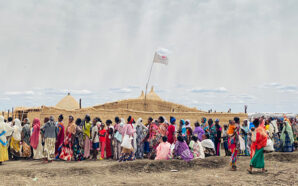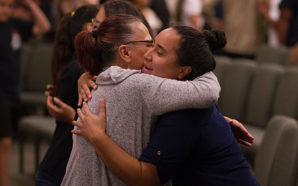We are all vulnerable and naked at our entry into this world and at our departure. We desperately need others to care for us. Like it or not, we are not in control. We are dependent. At such times, we experience our creaturehood most poignantly. It is truly a ‘God moment’ for each of us.
In between, we human beings often find esteem in the way we look. We can measure our standing with others by our appearance.
When a person is most vulnerable, as were Adam and Eve in the primeval story of Genesis, they need to be covered. The merciful act of ‘clothing the naked’ then, is an act of responding to the dependence of a fellow human being when they stand most in need. Sometimes it is good to remember that Jesus calls us to be tender to others in such moments of vulnerability. Hence, the importance of stories to remind us of our vocation to be ministers of mercy.
The classic story of St Martin of Tours recounted by his disciple Sulpicius Severus (360-425) reminds us that Christ himself is the one who is ‘naked’ before us constantly and will judge us with the words “When I was naked you …” (see Mt 25).
Accordingly, at a certain period, when Martin had nothing except his arms and his simple military dress, in the middle of winter, a winter which had shown itself more severe than ordinary, so that the extreme cold was proving fatal to many, he happened to meet at the gate of the city of Amiens a poor man destitute of clothing. He was entreating those that passed by to have compassion upon him, but all passed the wretched man without notice, when Martin, that man full of God, recognised that a being to whom others showed no pity was, in that respect, left to him. Yet, what should he do? He had nothing except the cloak in which he was clad, for he had already parted with the rest of his garments for similar purposes. Taking, therefore, his sword with which he was girt, he divided his cloak into two equal parts, and gave one part to the poor man, while he again clothed himself with the remainder. Upon this, some of the bystanders laughed, because he was now an unsightly object, and stood out as but partly dressed. Many, however, who were of sounder understanding, groaned deeply because they themselves had done nothing similar. They especially felt this because, being possessed of more than Martin, they could have clothed the poor man without reducing themselves to nakedness. The following night, when Martin had resigned himself to sleep, he had a vision of Christ arrayed in that part of his cloak with which he had clothed the poor man.
What has this got to do with us today? Few people are literally naked, but certainly millions of people own no more clothing than what they wear each day. If you search your cupboards and your heart, you may discover that you have more than you need. You can lend something to a friend for a special occasion. You can also restrain yourself from an unnecessary purchase and give the money to an agency that helps people in need of clothing.
Around the world, the St Vincent de Paul Society is the lay association most easily associated with this sacred mission of ‘clothing the naked’. The society was formed in 1833 by six students in Paris; the group’s founder, Frederic Ozanam (1813-53), recognised the call to relieve need, but also to tackle the cause of the need. For this reason he identified two virtues for the society: the call of charity and of justice.
The ‘Vinnies’ show us all how important it is to respond to the ‘nakedness’ of human vulnerability with compassion. What we need in the Church today are more people who – like the Vinnies, modern-day Martins of Tours – point to the beautiful bond of solidarity that connects us each to one other. Blessed are they who ‘walk’ with others rather than ‘talk’ at them!
If anything is going to evangelise others it is such witness. That ‘poet of the spirit’ Seamus Heaney puts it all so beautifully in his recent collection of poems, Human Chain. The poems are great spiritual reading.
One stands out for me – Miracle. It recalls those who carried the paralysed man to Jesus and lowered him through the roof. Such ‘miracles’ as they helped perform go on today. The ‘age of miracles’ is not over whenever the compassion of Jesus is lived out; wherever, as Heaney puts it, they ‘carry him’. Let us each in our Christian life ‘Be mindful of them as they stand and wait’.
MIRACLE
Not the one who takes up his
bed and walks
But the ones who have known him all along
And carry him –
Their shoulders numb, the ache and stoop deeplocked
In their backs, the stretcher handles
Slippery with sweat. And no let-up
Until he’s strapped on tight, made tiltable
And raised to the tiled roof, then lowered for healing.
Be mindful of them as they stand and wait
For the burn of the paid-out
ropes to cool,
Their slight lightheadedness and incredulity
To pass, those ones who had known him all along.
Seamus Heaney
This article is part of a series of Lenten reflections entitled A Spirit of Mercy: Reflections on the Works of Mercy by Br Mark O’Connor FMS.
Br Mark O’Connor FMS is the Vicar for Communications in the Diocese of Parramatta.








